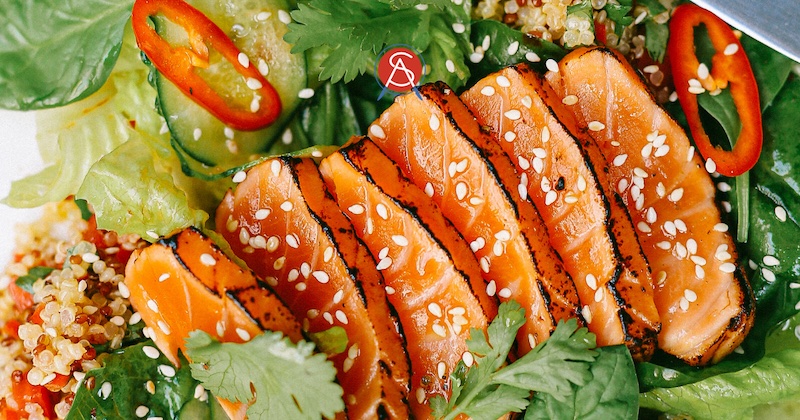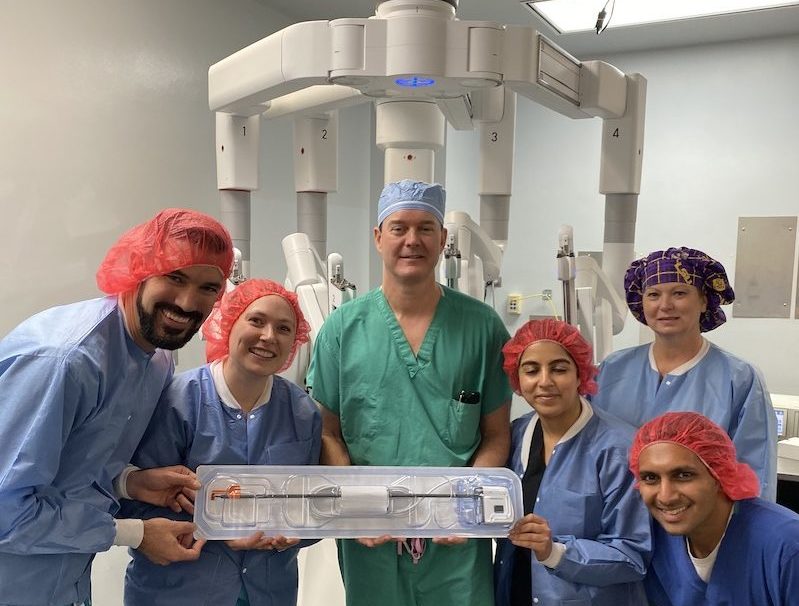Blog Archives
What We Know About Reflux After Gastric Sleeve
When you discuss the gastric sleeve with your surgeon, one of the risks that you will undoubtedly hear of is worsened acid reflux after the procedure. Recent data has shown that approximately 35% of gastric sleeve patients may experience new or worsened reflux. This research aligns with our own operative data.
Knowing that this is a very real risk, we place an emphasis on reducing the likelihood of acid reflux after gastric sleeve, but if it does happen to manifest, we take aggressive action to keep the patient comfortable and reflux-free.
Dr. Forrest Ringold Performs the First Synchroseal Worldwide
On December 5, Dr. Forrest Ringold became the first surgeon worldwide to use the newly FDA approved Synchroseal device. The device has been developed by Intuitive Surgical, the makers of the da Vinci Robotic Surgical System that Dr. Ringold uses for most of his procedures. Synchroseal docks seamlessly with the da Vinci robot.
Synchroseal is a completely new and innovative energy device for robotic procedures. Using two separate energy probes, the device can seal small vessels by cauterizing them to prevent bleeding during surgery. Further, a second probe can cut tissue simultaneously. In other words, we are able to synchronize the cutting and sealing of tissue for a more reliable, procedure.
Tricks to Getting Enough Protein after Bariatric Surgery

Protein is an essential nutrient for anyone looking to maintain a healthy weight. Too often, we don’t get enough protein; or we get enough protein, but we eat too much of the other bad stuff that goes with it. After any surgery, eating enough protein is helpful for a quicker recovery. It is particularly important after bariatric surgery when caloric intake is very limited, especially in the first few months after surgery. The typical bariatric patient needs between 60 and 80 grams of protein every day. However, with 70 to 80% of the stomach not receiving food after a sleeve or bypass procedure, is becomes truly difficult, if not impossible, to get that from regular food alone.
Why Diet and Exercise Fails for 95% of Obese Patients
If you have watched our seminar, had a consultation, or researched bariatric surgery, you will undoubtedly have come across the statistic that between 90 and 95% of obese people do not achieve long-term weight loss with diet and exercise alone. To be sure, improving one’s lifestyle in the form of better diet and exercise habits is a key component of any weight loss strategy. However, without a tool such as bariatric surgery, which is the only proven long-term weight loss solution for obese patients, most people do not get the results they want. So why are those who suffer from obesity having such a hard time losing weight?
All Soda, Including Diet Soda May Cause Early Death
The beverage industry is anchored, in large part, by soda sales. And this makes a lot of sense. Not only are sodas refreshing, but they are also incredibly sweet and satisfy our sugar cravings. As society became more health conscious, diet sodas were introduced using artificial sweeteners rather than sugar or high fructose corn syrup. With refinements in taste, today’s diet sodas offer much the same enjoyment, while not adding calories. On the face of it, it sounds like a great compromise. But soda, whether diet or regular, can be detrimental to health and ultimately shorten one’s lifespan.
Dr. Dusty Smith Is Certified In Hidden Scar Breast Cancer Surgery

We are very excited to offer Hidden Scar Breast Cancer Surgery. Dr. Smith truly understands how important the cosmetic aspect of breast cancer surgery for all women and how it can affect patient’s long term. Scars from breast cancer surgery have a very definite psychological impact on a woman after the operation. Some women embrace their scars as a reminder of what they have overcome. Others find the scars to be a constant reminder of a highly traumatic time in their life.
Gallbladder Discussion – Do Gallstones Cause Cancer?
With the prevalence of gallbladder removal surgery, or cholecystectomy, there are a number of misunderstandings about gallbladder disease that are worth addressing and discussing. One of these is whether gallstones can actually cause cancer.
To be sure, there are patients out there that have had their gallbladder removed and the pathology report has come back positive for gallbladder cancer. However, in most cases the cancer is unrelated to the gallstones themselves. We don’t fully know if gallstones are causal or just correlated, but with millions having gallstones and such a small risk of cancer, a causal relationship is unlikely. With that said, the formation of gallstones are signs of other gallbladder cancer risk factors such as age, being female and excess weight.
Great Food Substitutions for Any Time of Year
Bariatric patients quickly become familiar with thoughts of things they “can’t” eat, but we want to shift the focus to all of the many things you CAN eat, especially those available all year round. With limited real estate in the stomach, it is important to be aware of eating enough protein throughout the day as well as incorporating delicious, healthy side options as your new pouch allows you to add more to your diet. Continue reading
Solving Stress With Today’s Lifestyle
It is obvious that stress can contribute to weight gain in many ways. But how do we break the cycle and stop the stress related weight gain? For some, it is possible to combat the stress itself. Maybe there is a relationship that can be improved. It might even be unrealistic expectations you have for yourself that you can address on your own or thorough therapy. Evaluating the cause of your stress and working to decrease your reaction to the stressor, when it arises, can make a huge difference, but this can sometimes be difficult from the inside. Accepting the help of a trusted friend or even a healthcare professional could be the ticket to finding a more peaceful daily life, and smaller waistline.
Can GERD Cause Esophageal Cancer?
Gastroesophageal reflux disease, abbreviated as GERD, is characterized by the chronic backflow of stomach acid into the esophagus. This acid reflux occurs, when the Lower Esophageal Sphincter, or LES, does not effectively do its job of sealing food and digestive fluids in the stomach once they are swallowed and travel down the esophagus and into the stomach. The reflux, frequently called heartburn, feels like a pain in the chest that starts behind the breastbone and moves to the throat. Patients sometimes report an unpleasant acid taste in the mouth. Patients with GERD sometimes experience a frequent cough or difficult or painful swallowing as the condition persists.


